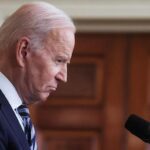
Feb. 25—ANDERSON — Though Russian President Vladimir Putin recently has expressed a desire to restore his nation to its former Soviet glory by repatriating Ukraine and other lands that gained independence three decades ago, local academics aren’t in agreement as to what his next steps will be.
Ball State University history Professor Sergei Zhuk, a native of Ukraine who still has family, friends and property there, said he believes the former KGB intelligence officer under the Soviet Union will make his next move on the small Baltic nations of Estonia, Latvia and Lithuania.
He likened Putin’s invasion of Ukraine to German dictator Adolf Hitler’s invasion of Poland in 1939.
“I watched this every minute on CNN and social media. I probably have more information than the journalists covering this,” he said.
However, Jaye Lee Rogers, chair of Anderson University’s history department — where one of her specialties is Russia — said she believes it’s unlikely Putin will try to reclaim other former Soviet states, such as Azerbaijan or Kazakhstan, because they have nothing he wants and are largely Muslim nations that would bring other challenges.
She also doesn’t believe Russia is likely to try to reclaim Eastern bloc allies such as the Czech Republic, Hungary or Poland.
Ukraine was attractive because of its resources, each of the academics said. It has served as the breadbasket for western Russia’s major cities, including Moscow and St. Petersburg, for centuries.
Trained as a Soviet expert in the history of the United States and Canada, Zhuk wrote the book “KGB Operations Against the USA and Canada in Soviet Ukraine, 1953-1991,” the same era in which Putin served. He also recently taught a course titled “Putin’s War against Post-Soviet Ukraine: A History.”
The difference under the Soviets was they were governed not by a single madman, he said, but by the Politburo, the chief policy-making group.
“It’s worse than under Stalin,” he said. “This small man — and he is small physically — has access to nuclear weapons, and that’s a very dangerous situation.”
Michael Frank, a political science professor at AU, who studied Ukraine in college, said the tension between the two nations came on his radar shortly before the Beijing Olympics. He believes invasion of the nations surrounding Russia is part of Putin’s long-term plan.
“I was thinking they are going to invade after the Olympics are over. You don’t do that during the Olympics. That would get too much negative attention, as we have seen,” he said.
What the professors do agree on is that Russia’s 2014 invasion of Crimea was a test run to see what the Western NATO allies would do in the event of a takeover of Ukraine. Neither the U.S. nor NATO took up arms to stop his advance.
“The only thing that would stop Putin from moving forward, moving into the Ukraine, is if the price that Russia would have to pay was too steep. The economic sanctions put in place apparently were not a steep enough price,” Frank said. “There’s going to have to be more than just economic sanctions on the table. There’s going to have to be credible military response.”
In addition to gaining control over a former territory and its resources, Frank said, Russia also invaded Ukraine to stop the possible spread of democracy from coming too close to home.
The Russian leader has spent a great deal of time and energy trying to undermine democracy in the West, especially in the United States, by interfering in elections, spreading misinformation and encouraging ideological division, he said.
“Russia is actively in opposition not only to the spread of democracy but democracy in general,” he said. “You want to keep that spread of democracy from going into Russia, because that would change everything.”
Russia is actively engaged in dividing the American public, using social media as its primary weapon, harnessing the controversies of the day, such as masking against COVID-19 or critical race theory, Frank said.
“Wherever they see smoke, they’re going to pour gas on that. They don’t have to create stuff. They just need to fan the flames.”
As a historian, Rogers said she believes Putin wants to be remembered as the person who reunified the Soviet Union. And he apparently doesn’t mind if he is remembered in the same way as Nazi Germany’s Hitler, Italian fascist Benito Mussolini or Russia’s own Joseph Stalin.
“He has no problem getting rid of people who disagree with him or try to argue with him,” Rogers said.
Though the older generation in Ukraine? may be more complacent about a return to Soviet life, Rogers and Zhuk said the younger generation, for whom Soviet life is just history, has no interest in having their country swallowed up by Russia.
“This is a generation that grew up with no connection to Russia. They do not care about Putin.”
Follow Rebecca R. Bibbs on Twitter at @RebeccaB_THB, or call 765-640-4883.




